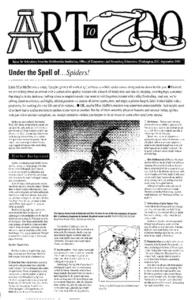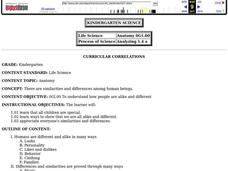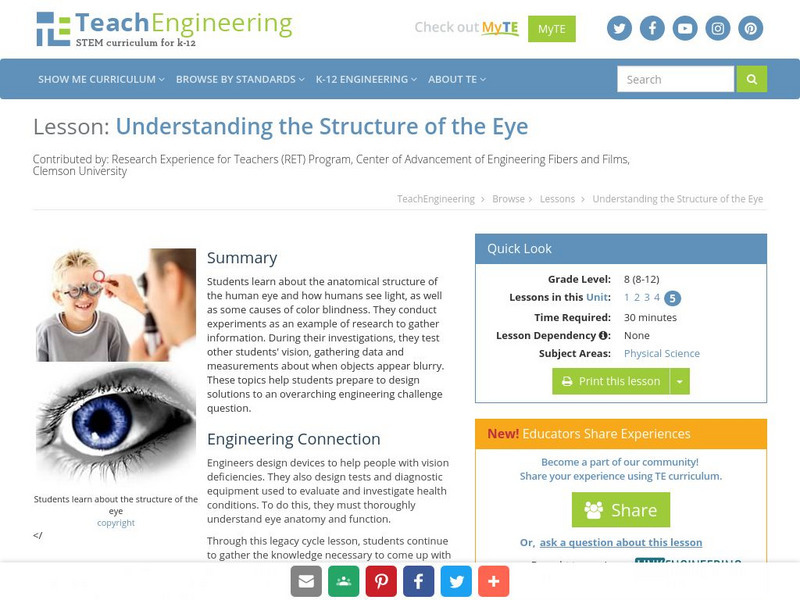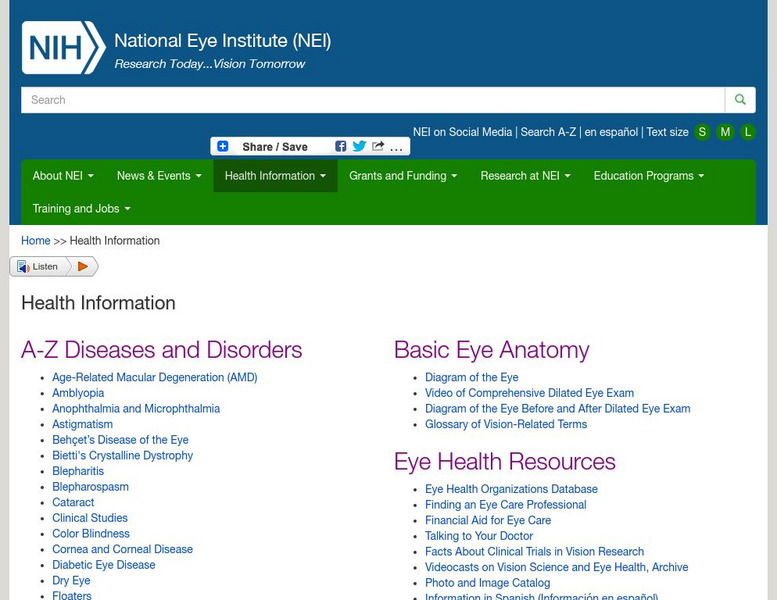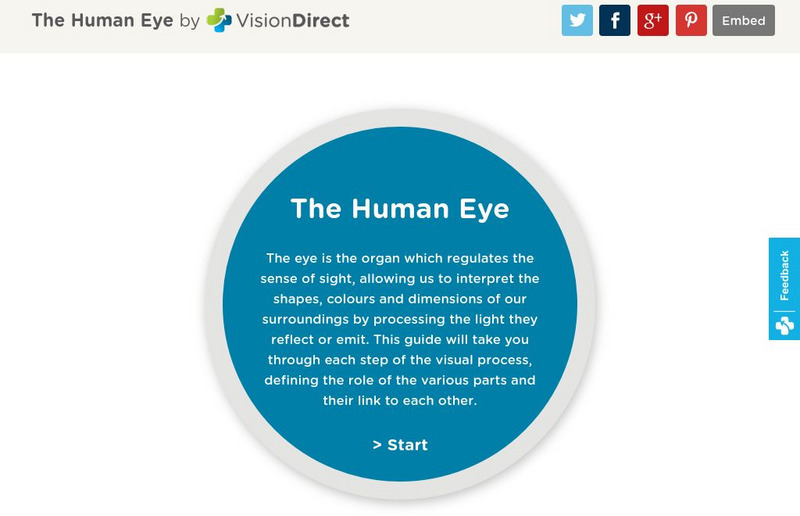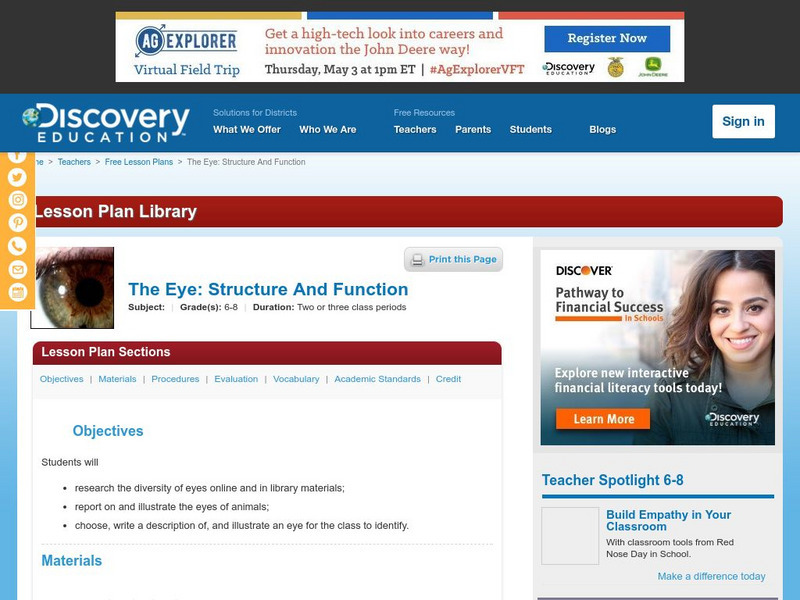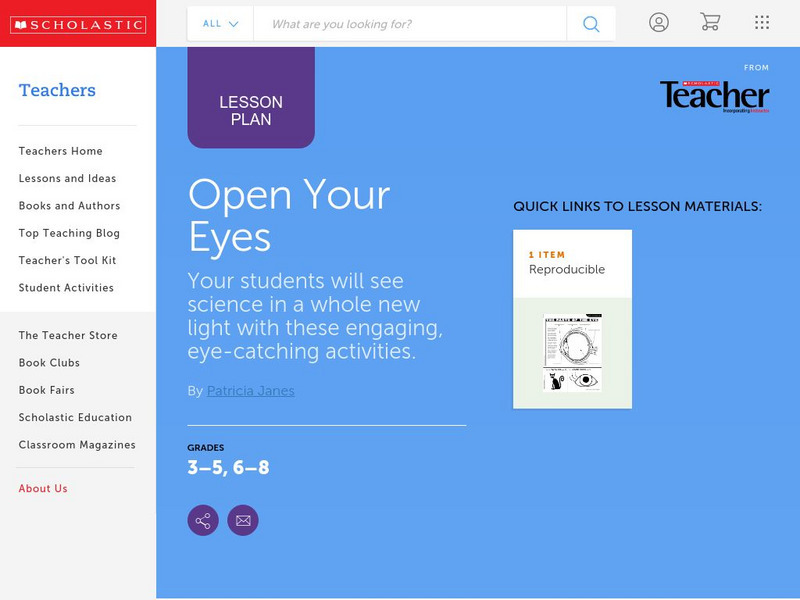Curated OER
Animal Parts
In this animal body parts instructional activity, students play a matching game where they match 16 different animal part cards with the corresponding animals provided on a list. Picture and word cards are provided. Directions for...
Curated OER
Label Your Body
Students assimilate the names of the parts of the body. They practice spelling body part words using a worksheet. They trace the outline of their bodies, add features and label the body parts from the vocabulary list.
Curated OER
Under the Spell of Spiders!
Learners read about spider body parts, abilities, tendencies, and life cycles. In this Under the Spell of Spiders! lesson, students create mystery creatures that turn out to be spiders. Learners catch and observe spiders and insects....
Curated OER
Are You a Frog?
Students listen to the book "Ask Me If I'm a Frog, and compare their anatomy and habits to the anatomy and habits of a frog to identify with the characteristics unique to frogs. They respond to teacher-generated questions by writing...
Curated OER
Anatomy
Students explore the similarities and differences in human beings. They consider that all students are special, and appreciate everyone's similarities and differences.
Curated OER
Levers in the Body: They Are Not What You Might Think!
Students investigate lever systems in the human body and compare arm anatomy to model. In this human levers instructional activity students graph and analyze their results.
Curated OER
Body Exercises: Galaxy 3
In this animal body parts worksheet, students label the animals, complete sentences, complete a word search, and more. Students complete 4 activities.
Curated OER
ESOL Vocabulary for Body Parts
Students review and write the vocabulary for basic body parts. They identify parts of the body along with new verbs then complete an activity sheet of labeling body parts and complete sentences using the correct vocabulary word.
Curated OER
Review of the Five Senses
Students investigate the five senses. In this human biology lesson, students are given five items and identify which items match best with each of the senses. Students use objects such as a rock, hard candy, and a flower.
Curated OER
What Kind of Insect is That?
Fifth graders characterize insects and classify insects according to the Linnaean system. They use hand lenses or microscopes to examine insect body parts.
PBS
Lesson Plan: “Seeing the Way: A Brief History of Cataract Surgery”
After looking at the history of cataract surgery techniques, your high schoolers will have a new perspective on medical and scientific advances. Kids alternate between watching short video clips, class discussion, and computer research....
Curated OER
Simple Preparation Can Improve Reading Comprehension
Reading comprehension is key to success in nearly every subject in school, but how do you improve comprehension in a pupil with dyslexia? Here are several tips that define ways in which educators can provide strategies to improve overall...
Curated OER
Zoo Vet
Students come up with a list of all the animals that might be found in a zoo. They think of all the things that a zoo needs to do and provide for each animal. They discuss what the role of any zoo should be. They design a healthy zoo...
Curated OER
Five Senses - Learning With The Senses
Students name the five senses, compare learning with and without the senses.
TeachEngineering
Teach Engineering: Understanding the Structure of the Eye
Students learn about the anatomical structure of the human eye and how humans see light, as well as some causes of color blindness. They conduct experiments as an example of research to gather information. During their investigations,...
National Institutes of Health
National Eye Institute: Health Information
This site provides a wealth of information regarding the human eye. Special focus is given to the diseases and disorders, ranging from age-related mascular degeneration to usher syndrome.
Other
Vision Direct: The Human Eye
Explore this interactive visual to learn the parts of the eye, what the function of each is, and how they work together to give us the ability to see.
Other
Lens Shopper: Anatomy of the Eye
Learn about the human body's own "camera" as you explore the inner workings of the human eye. This resource is displayed as a three-dimensional, interactive animation.
TeachEngineering
Teach Engineering: Biomedical Devices for the Eyes
Students examine the structure and function of the human eye, learning some amazing features about our eyes, which provide us with sight and an understanding of our surroundings. Students also learn about some common eye problems and the...
Biology Pages
Kimball's Biology Pages: The Human Eye
Written by a former author of Biology textbooks, this page describes not only color vision, but the anatomy of the eye, and color blindness. Easy to understand language.
Physics Classroom
The Physics Classroom: Refraction/ray Model of Light: The Anatomy of the Eye
An introduction to the human eye as it relates to the physics ray model of light and image formation.
Discovery Education
Discovery Education: The Eye: Structure and Function
In this lesson, students learn about the structure and function of the human eye and research how it compares to animal eyes. They will then choose an eye, write a description, and make an illustration of it, which other students will...
TeachEngineering
Teach Engineering: Waves: The Three Color Mystery
Students are presented with a challenge question concerning color blindness and asked to use engineering principles to design devices to help people who are color blind. Using the legacy cycle as a model, this unit is comprised of five...
Scholastic
Scholastic Instructor: Open Your Eyes
This webpage is a great resource for elementary teachers who are looking for activities, lessons, facts, and experiments pertaining to the eye.


